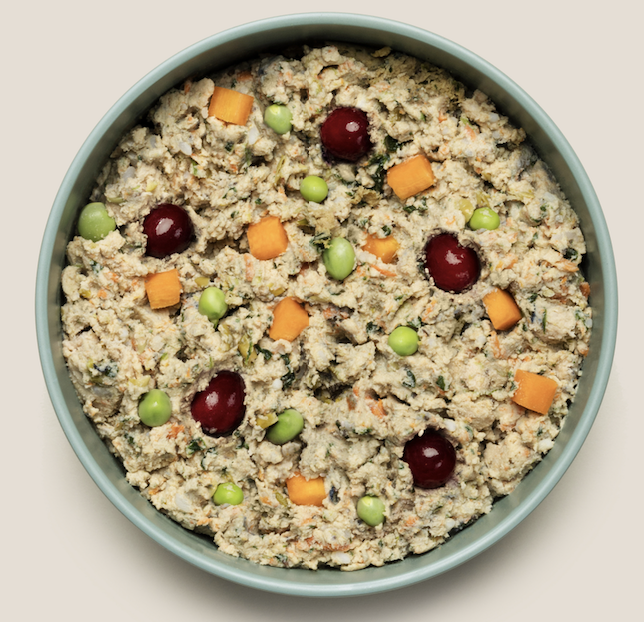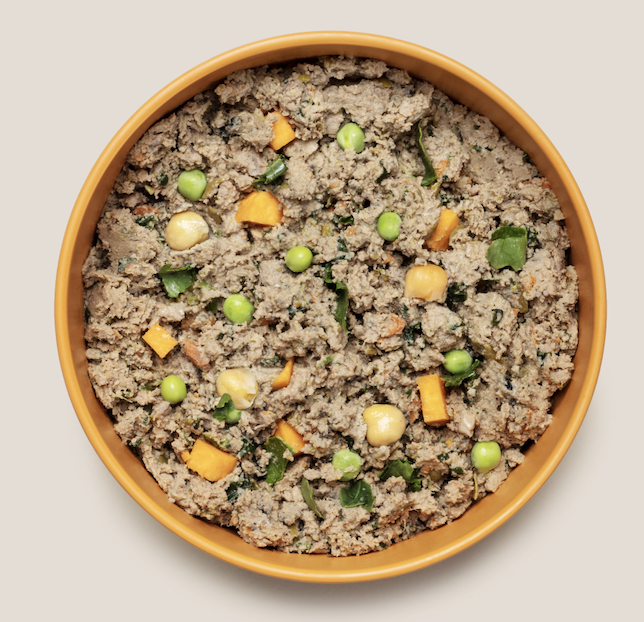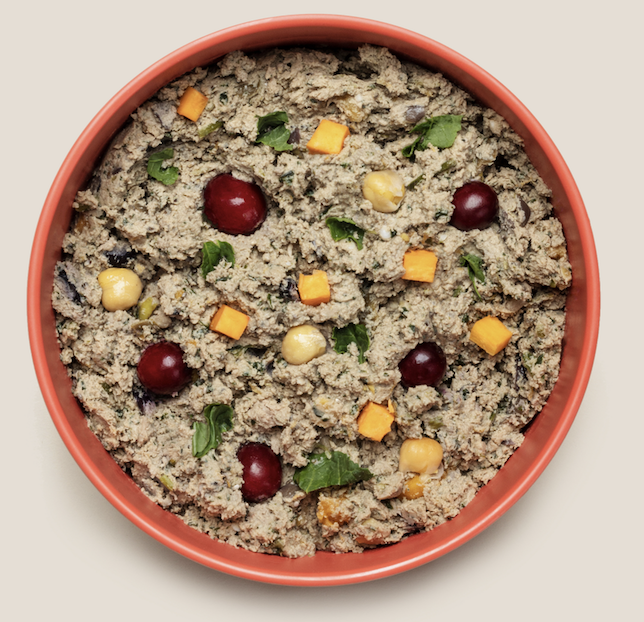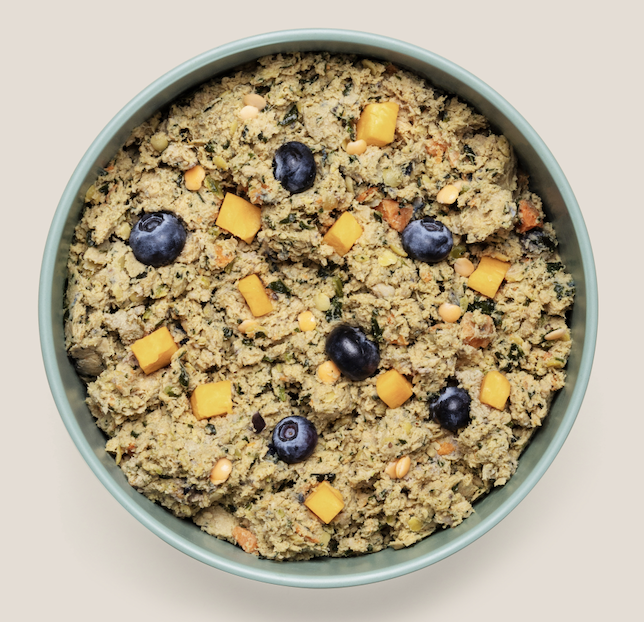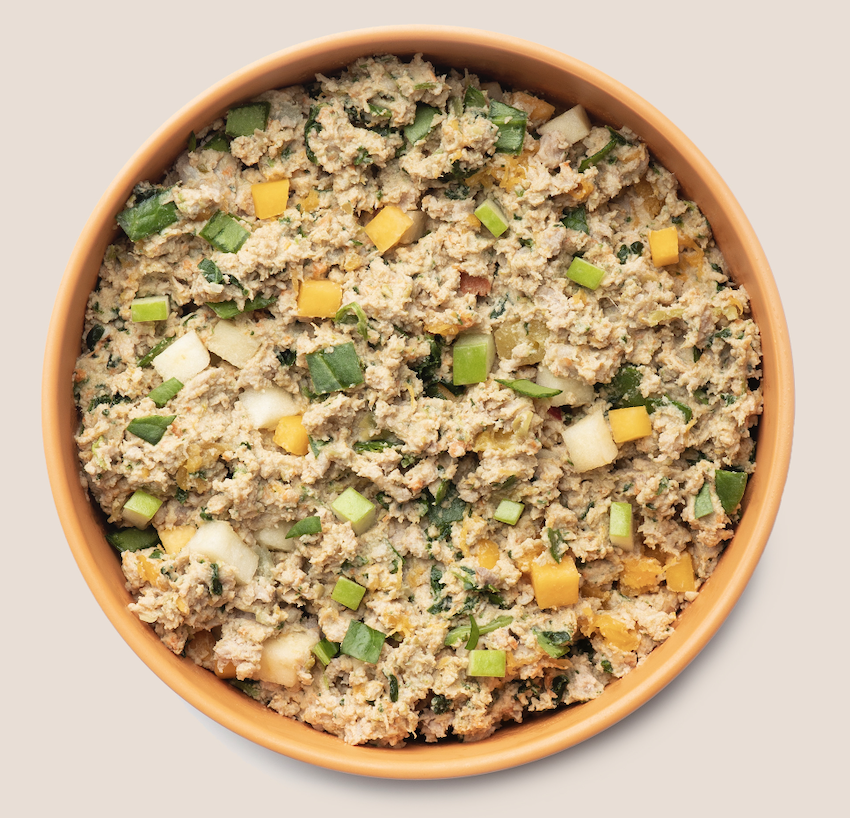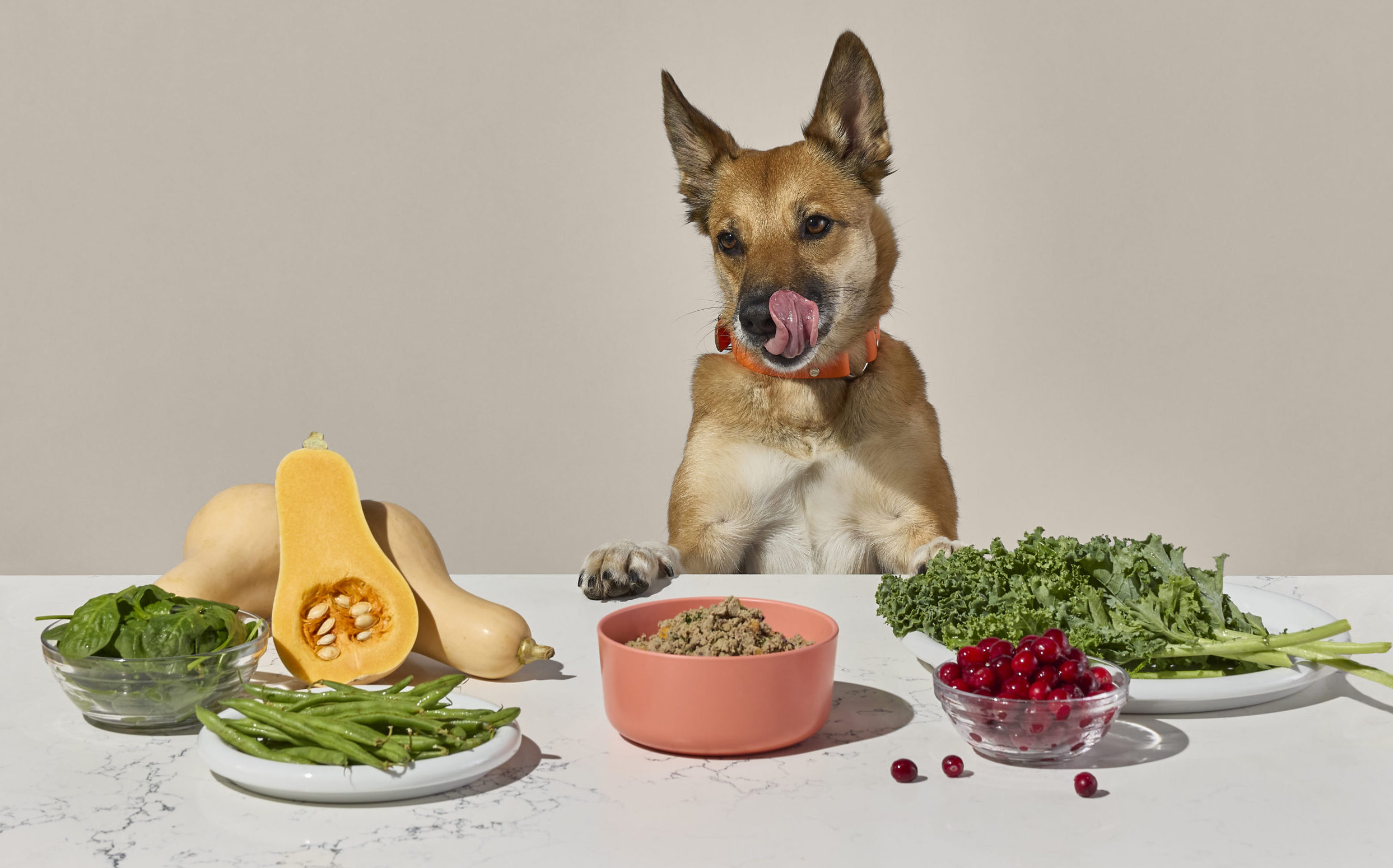Hey Ollie blog readers! We’re offering you an exclusive 60% OFF your starter box! Try now!
Meat, or protein, is the main star in most dogs’ diets, and for good reason. High-quality meat gives dogs the protein they need to build strong muscles, maintain energy, and stay healthy from puppyhood to their senior years.
But what meat is best for dogs? With so many choices, from classic chicken and beef to lean turkey or even more unique options like duck and lamb, it can be hard to know what’s healthiest for your pup.
In this article, we’ll break down the benefits and drawbacks of popular meats for dogs, explain what to look for in quality meat, and help you choose the best meat for your dog’s bowl.
Why Do Dogs Need Meat or Protein in their Diets?
Although vegetarian dog foods exist, veterinary experts agree that a complete and balanced canine diet should be meat-based.
Meat provides incredible nutritional benefits for dogs that cannot be replicated with a plant-based diet. In addition to having a digestive tract that is biologically adapted for meat consumption (e.g., a highly-acidic stomach and short small intestine), reasons for feeding a meat-based diet include:
- Enhanced digestibility — Most meats are highly digestible which allows for maximum nutrient absorption and reduced waste. Exceptions include dogs with food allergies or particularly fatty meat cuts. For this reason, dog owners should be selective about the meat they offer their pup.
- Increased amino acids — Meat contains more essential amino acids than plants.
- High nutrient content — Meat naturally contains essential vitamins and minerals including zinc, selenium, iron, B vitamins, phosphorus, and taurine—an amino acid that may play a role in preventing dilated cardiomyopathy (DCM).
While these nutritional benefits go largely unseen to the naked eye, on a larger scale meat fuels your dog’s daily activities by providing easily digestible energy, improves their recovery by supporting muscle repair, and promotes a consistent internal balance by contributing to hormone, antibody, and enzyme production and regulation.
The Most Popular Meats for Dogs
1. Chicken
Chicken is a popular protein for pups primarily because chicken is an affordable and readily available source of protein. At Ollie, our Chicken Recipe combines chicken muscle and organ meat with rice, pumpkin, and carrots to create a nutritious and balanced meal for your dog.
While chicken is certainly one of the most popular proteins, it is a common cause of food allergies in dogs. If you notice your pup displaying food allergy symptoms, chat with your vet and discuss putting your pup on a chicken-free diet.
2. Beef
Beef is another high-quality protein source that is widely available for dogs. It’s used in many commercial dog foods, including Ollie! We use cow-based muscle and organ meat to give your pup the best nutrition. Our Beef Recipe is an excellent choice for pups who are allergic to chicken or poultry or for pups who prefer the taste of beef.
It is important to know that companies can use a variety of different beef cuts. While most of these cuts are similar from a nutrient standpoint, they can vary widely in price.
If you decide to cook beef for your pup, choose a leaner cut or drain off the excess fat before sharing. If your pup is under the weather, you can use ground beef and rice for a bland diet. Just be sure to boil or brown the beef and skim off all of the fat. In this case, the meat should be a little dry.
3. Salmon
Your pup can enjoy grilled or baked salmon with you. Even if you enjoy your salmon medium or medium-rare, it is important that you cook your pup’s filet well-done. While salmon’s nutritional facts don’t look as good on paper as beef or chicken, this popular pink fish has one key component that other meats lack—the super-nutrient omega-3 fatty acids.
Although it is modest in protein and high in fat, salmon is an incredible source of Omega-3 fatty acids. These fatty acids help with everything from your pup’s coat and brain to their joints. Omega-3’s are also natural anti-inflammatories, which can ease chronic conditions such as arthritis and allergies. While Ollie doesn’t make a salmon recipe, you can certainly add some to your pup’s favorite food.
4. Lamb
Lamb is another great meat choice for pups. While not as common as chicken, beef, or turkey, lamb can often be a suitable protein alternative for pups with food allergies. Since lamb’s water content is higher than beef or chicken, you will need to feed more lamb to reach the same level of protein. But if you feed your pup Ollie’s Lamb Recipe, you won’t need to worry—our expert team does all the cooking and mixing for you so that you only have to open the package and let your pup chow down.
5. Turkey
Turkey isn’t just for Thanksgiving, your pup can enjoy this delightful poultry option all year. Leaner and slightly lower in fat than chicken, the taste of turkey delights many pup’s taste buds and is considered a gentle option for dogs with sensitive stomachs. Pups can even enjoy your holiday turkey, as long as it is plain, skinless, and free from toxic garlic and onions, and any rich sauces or gravies.
If you love to cook for your pup, you can roast a turkey breast in the oven. The internal temperature must reach at least 165 degrees Fahrenheit to ensure any pathogens are killed in the cooking process. But, if you don’t have time to roast a turkey breast for your pup, you’re in luck—Ollie makes a delicious Turkey Recipe that your dog can enjoy without dirtying any dishes, beside their bowl, of course.
Alternative Meat Options for Dogs
Pork
While pork is a less common option for dogs, offering the other white meat to your pup is perfectly fine. Simply avoid the fattier cuts as well as cured products such as bacon, ham, and sausage as they can cause pancreatitis and make your pup gain weight. Excessive salt and nitrates found in cured products and deli items can also be harmful to your dog’s cardiovascular health.
Like any other protein source on this list, do not offer undercooked or raw pork to your pup, as improperly or uncooked pork can cause trichinosis. Instead, brown some plain lean ground pork in a pan and drain off the fat before serving your pup.
Unfortunately, when it comes to pork-based dog foods, there are only a few commercially made options—far less than most of the other proteins we’ve reviewed.
Bison and Buffalo
Bison and buffalo—yes, they’re technically two different animals but the terms are frequently interchanged—are also acceptable protein sources for your pup. If someone in your family is a hunter or you have access to this game meat, you can offer it to your pup. As always, ensure the meat is thoroughly cooked before serving it to your dog.
Leaner than beef but still meaty in texture, bison can offer your pup some variety and a delicious new flavor. However, bison is lower in protein than beef so adjust your portion sizes accordingly. If you aren’t interested in being your dog’s personal chef, commercial bison-based dog foods are available.
Best Food for Dogs with Sensitive Stomachs & Digestive Issues
Duck
If your pup is a picky eater, duck might be just the temptation they need to devour their dinner. Sometimes blended into commercial diets, duck is probably one of the less popular proteins for pups—potentially because of its high fat content or high cost. If your pup needs to lose a few pounds, look for a leaner protein or feed duck only in moderation.
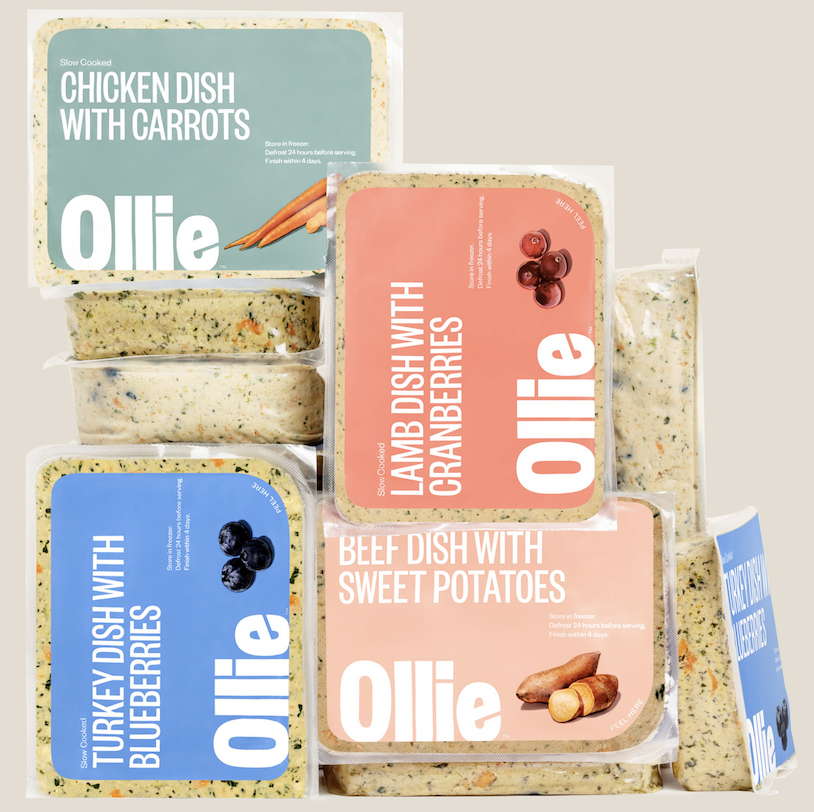

Find Out Which Recipe Plan is Right for Your Dog’s Needs
Get 60% of your first box of Ollie’s fresh
delivered meals today!
Exotic Meat Used in Dog Foods
For some pups with food allergies or adventurous palates, the meats listed above might not be enough to satisfy their appetite or health needs. In recent years, exotic meats (i.e., novel or new proteins) such as crocodile, kangaroo, ostrich, and even pheasant have found their way into dog food recipes to accommodate food-sensitive and allergic pups.
If you are considering feeding exotic meat to your dog, first chat with your vet to ensure you understand the nutritional profile and any risks. Boutique, exotic, and grain-free (BEG) diets have come under scrutiny in recent years, so do your research before making a switch.
Raw Versus Cooked Meat for Dogs
Raw meat diets are an ongoing trend in the dog food industry that promises to deliver enhanced nutritional value by preserving the nutrient profile of fresh uncooked meat. Unfortunately, raw meat can also carry dangerous risks for pups and people such as food-borne illness (e.g., E. coli, listeriosis, Salmonella), nutrient deficiency, and digestive issues from consuming too much or too little bone (i.e., a necessary calcium and mineral source).
At Ollie, we balance health and safety by gently cooking our proteins. This preserves optimal nutrient content while destroying harmful bacteria.
What Meat is Best for Dogs?
The word “best” can mean different things depending on your dog’s health, age, and taste buds. There’s no one-size-fits-all answer because each meat has its own pros and cons, and every dog is unique.
For example, chicken is lean and affordable, but some dogs develop sensitivities to it over time. Beef is tasty and high in iron, but it can be too rich for dogs with sensitive stomachs. Fish like salmon brings healthy omega-3s, while novel proteins like duck or venison can be great for dogs with food allergies.
So, what meat is best for dogs? The simple answer is: the one your dog digests well, enjoys eating, and that fits their nutritional needs. According to the American Kennel Club (AKC), High-quality meat protein is the foundation of a balanced canine diet.
Always check the meat source, too — look for human-grade, responsibly sourced cuts with no fillers, additives, or unnecessary by-products. Fresh, minimally processed meat is easier to digest and helps dogs get the most nutritional benefit from every bite.
How to Choose the Best Meat for Your Dog’s Breed and Age
Choosing the best meat for your dog isn’t just about what’s in the fridge, your dog’s breed, size, and age can all make a difference.
Puppies and young dogs: They need protein to grow strong muscles and bones. Lean meats like chicken, turkey, and fish are great starter proteins. They’re easy to digest and low in unhealthy fats.
Large breeds: Bigger dogs often do well with red meats like beef, bison, or lamb, which offer more iron and fat to fuel their higher energy needs. Just keep portions balanced to avoid weight gain.
Senior dogs: Older dogs may benefit from lean, easily digestible meats like turkey or white fish. They often need fewer calories but higher-quality protein to maintain muscle.
Dogs with allergies: If your dog has food sensitivities, your vet might recommend novel meats like duck, venison, or rabbit, proteins they haven’t been exposed to before. This can help prevent flare-ups.
No matter your dog’s age or breed, variety can help too. Rotating proteins every so often can keep mealtime exciting and may help prevent food boredom or ingredient sensitivities.
And remember, every dog is different. Always talk with your vet before making major changes to your dog’s protein source, especially if they have health concerns or special dietary needs.
Try Ollie Fresh Dog Food Today!
How Much Protein Should My Dog Consume?
Although protein is a crucial component of your dog’s diet, too much can be harmful to their health. The Association of American Feed Control Officials (AAFCO) recommends that healthy adult dogs receive maintenance dog food with a minimum of 18% protein. Growing, pregnant, and lactating dogs have increased protein needs, which is reflected in the AAFCO recommendation of 22%.
At Ollie, meat is a key ingredient in all five of our recipes. We use human-grade muscle and organ meats and mix them with fruits, vegetables, and other superfoods to keep your pup healthy and interested in our food.
Although you can pick just one Ollie recipe, we encourage you to try any of our recipes that are appropriate for your pup so they can enjoy a variety of proteins and flavors as well as the health benefits that come with them.
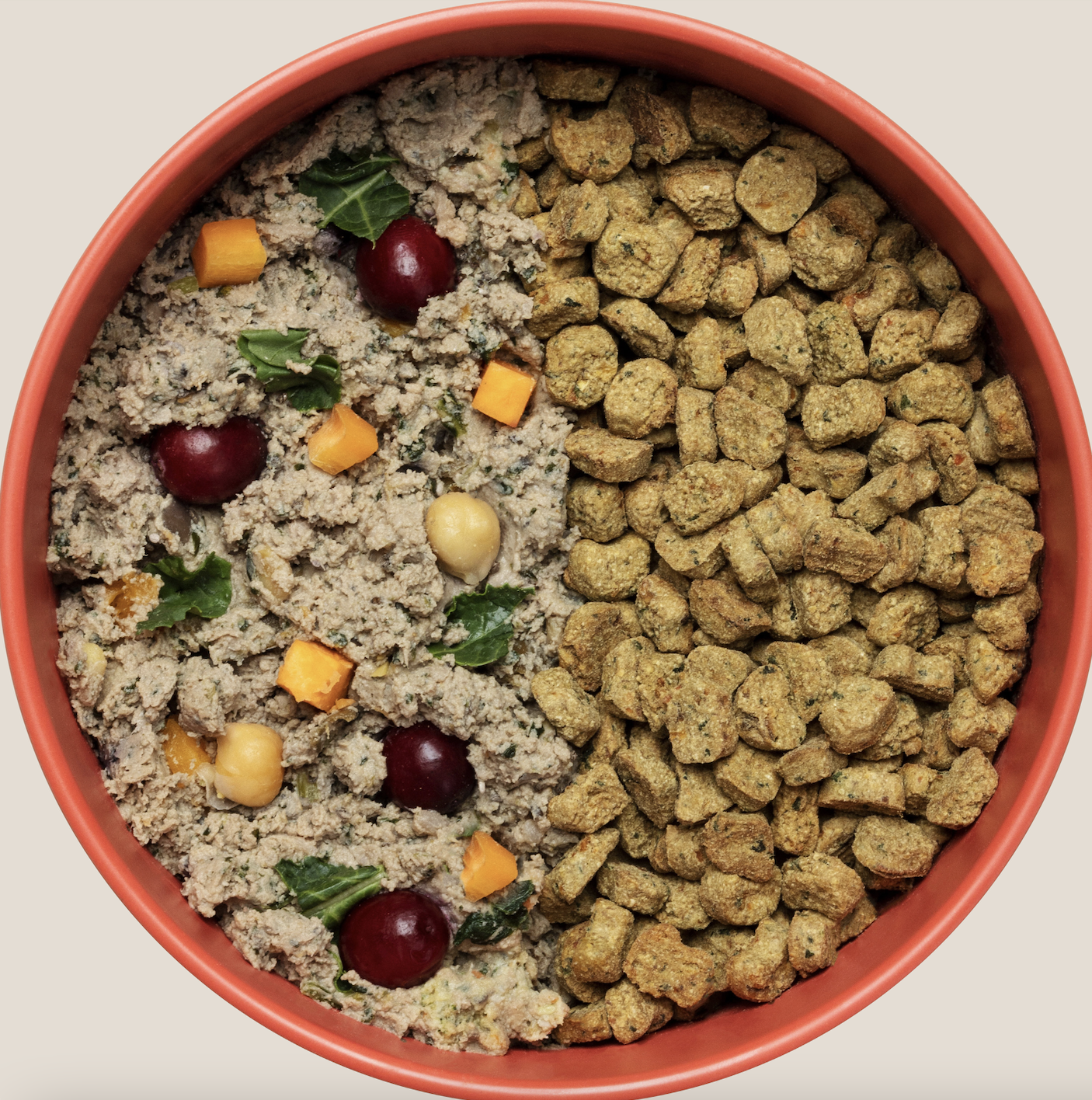

Discover our meat-based meals, perfect for your dog!
Get 60% of your first box of Ollie’s fresh
delivered meals today!
Frequently Asked Questions About the Best Meat for Dogs
What meat is healthiest for dogs?
Many vets agree that lean meats like chicken, turkey, and fish are among the healthiest choices for most dogs. These proteins are easy to digest and low in unhealthy fats. But what’s healthiest for one dog might not be best for another, so always watch how your dog reacts.
Is beef or chicken better for dogs?
Both beef and chicken can be great protein sources. Chicken is usually leaner and easier on sensitive stomachs. Beef has more iron and fat, which can be good for active dogs. If your dog has food allergies, you may need to rotate proteins or try something new.
What meat should dogs avoid?
Avoid processed meats like bacon, sausage, or deli cuts, they’re high in salt, fat, and additives that aren’t good for dogs. Also skip seasoned or heavily marinated meats. Raw pork should be handled carefully or avoided altogether due to parasites.
Can I mix different meats for my dog?
Yes! Rotating proteins or mixing meats can help give your dog a balanced diet and keep mealtime interesting. Just introduce new proteins slowly to avoid stomach upset.
Is raw meat better than cooked meat for dogs?
Raw feeding is popular but comes with risks. Some dogs do well on raw, but there’s a higher chance of bacteria like Salmonella. Cooked, fresh meat is generally safer and easier to portion correctly. Always check with your vet before starting a raw diet.
The Ollie blog is devoted to helping pet parents lead healthier lives with their pups. If you want to learn more about our fresh, human-grade food, check out MyOllie.com.
Tagged As:

The nutrition your dog needs,
the food they want.

Enjoying our articles? Subscribe our Newsletters and get new articles directly to your inbox
You might also like
21 July 2025
6 MINS READ
Can Dogs Eat Nuts? Which Nuts Are Safe & Serving Guide
Can dogs have nuts? Some nuts are fine in moderation, but others can cause serious harm. This quick guide breaks down which nuts are safe for dogs, which to skip, and how to feed nut butters respon…
18 July 2025
4 MINS READ
New Puppy Diet Recommendations for Healthy, Happy Growth
As a new pup parent, one of the biggest ways you can support your puppy’s long-term health is by providing the right nutrition. A puppy’s dietary needs are different from an adult dog’s, and…
by Ollie Pets
18 July 2025
5 MINS READ
How Human-Grade Dog Food Benefits Your Pup’s Health and Happiness
You’ve likely heard the term “human-grade” dog food, but what does it really mean, and is it worth it? Choosing human-grade food can be a significant investment for your dog’s long-term he…
by Ollie Pets

